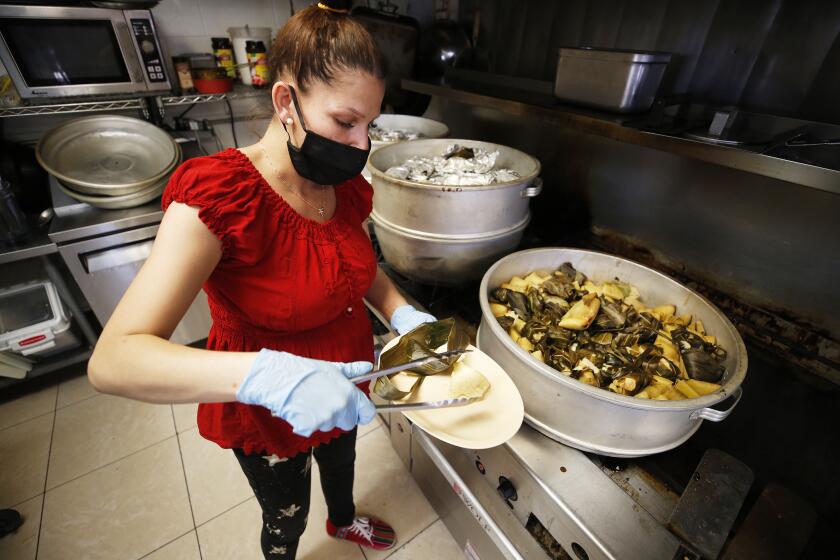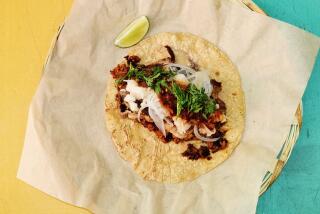Is a ‘Viva Mexico’ salad Mexican food? A judge will soon tell us
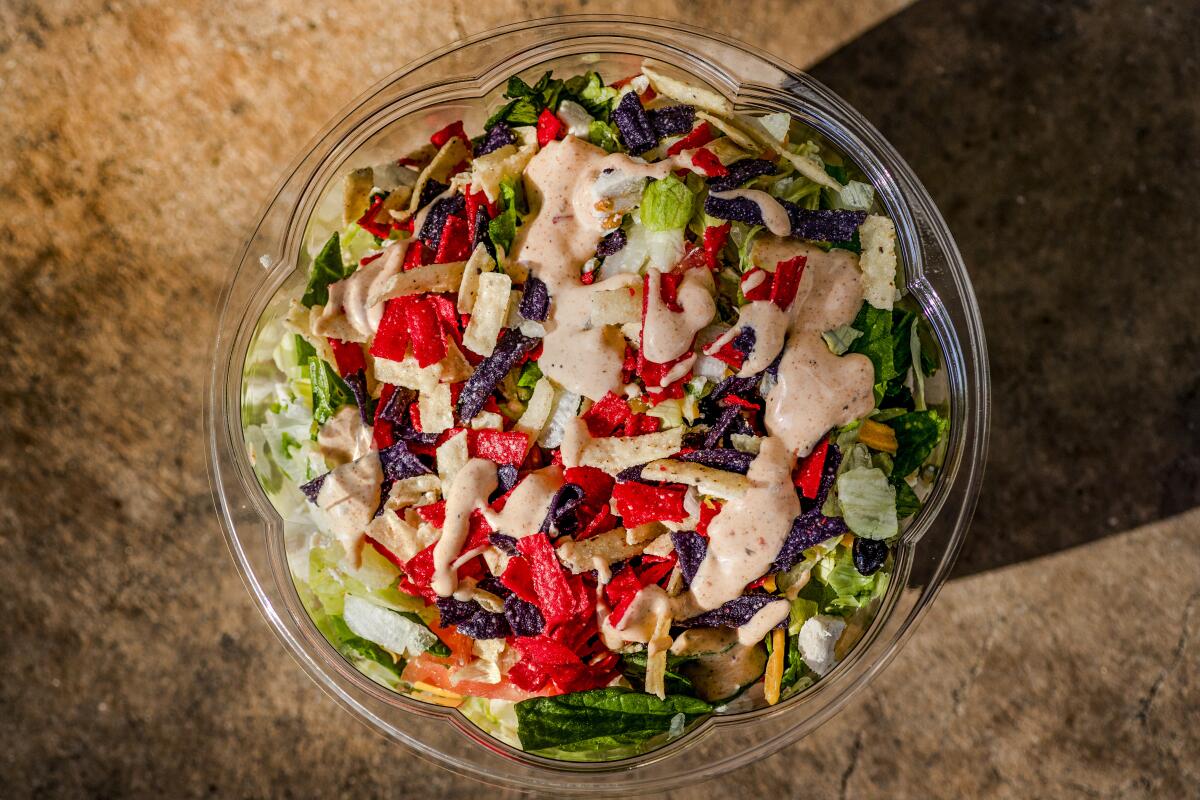
- Share via
There was nothing Mexican about the “Viva Mexico” salad I ate recently at a fast-casual restaurant called Chop Stop in Brea.
A wan mix of iceberg lettuce and spinach served as the base for ingredients that were supposed to evoke a south-of-the-border fiesta in my mouth but instead left it confused. The jalapeños were as rubbery and bland as the roasted chicken. The stale tortilla strips offered no crunch. The black beans featured little in the way of flavor, while the creamy chipotle dressing tasted like mayo spiked with watered-down Tapatío.
Maybe I would’ve thought more of Mexico with each bite if the Viva Mexico had cribbed avocado from Chop Stop’s Cobb salad or borrowed soyrizo from its Vegan Chorizo one. Instead, I was reduced to fishing out the salad’s stray strands of cheddar cheese in an attempt to will a quesadilla to life.
Mexican food is a multibillion-dollar industry in the United States that any smart restaurateur will lean on in the quest for a few more bucks. That’s the only explanation I can surmise as to why Chop Stop, a chain with 27 locations in California, Nevada and Texas, deigns to call its Viva Mexico salad by that name. Or deems another one “Santa Fe,” even though the extent of that salad’s evocation of New Mexico’s capital is roasted corn kernels.
No casual fan of Mexican food would mistake either of those salads for anything remotely Mexican. But in a Nevada courtroom, a legal dispute involving the items offers a fascinating study of how Mexican food isn’t a story of absolutes but rather evolution.
The case involves a Las Vegas-based Chop Stop, a neighboring Cafe Rio and their landlord, Los Angeles-based Dynamic Real Estate Partners. Cafe Rio says that the Viva Mexico and Santa Fe salads are Mexican food, which violates Cafe Rio’s lease that doesn’t allow any other restaurant in the shopping plaza that the two share to gross more than 10% of its sales from “Mexican or Tex-Mex food.”
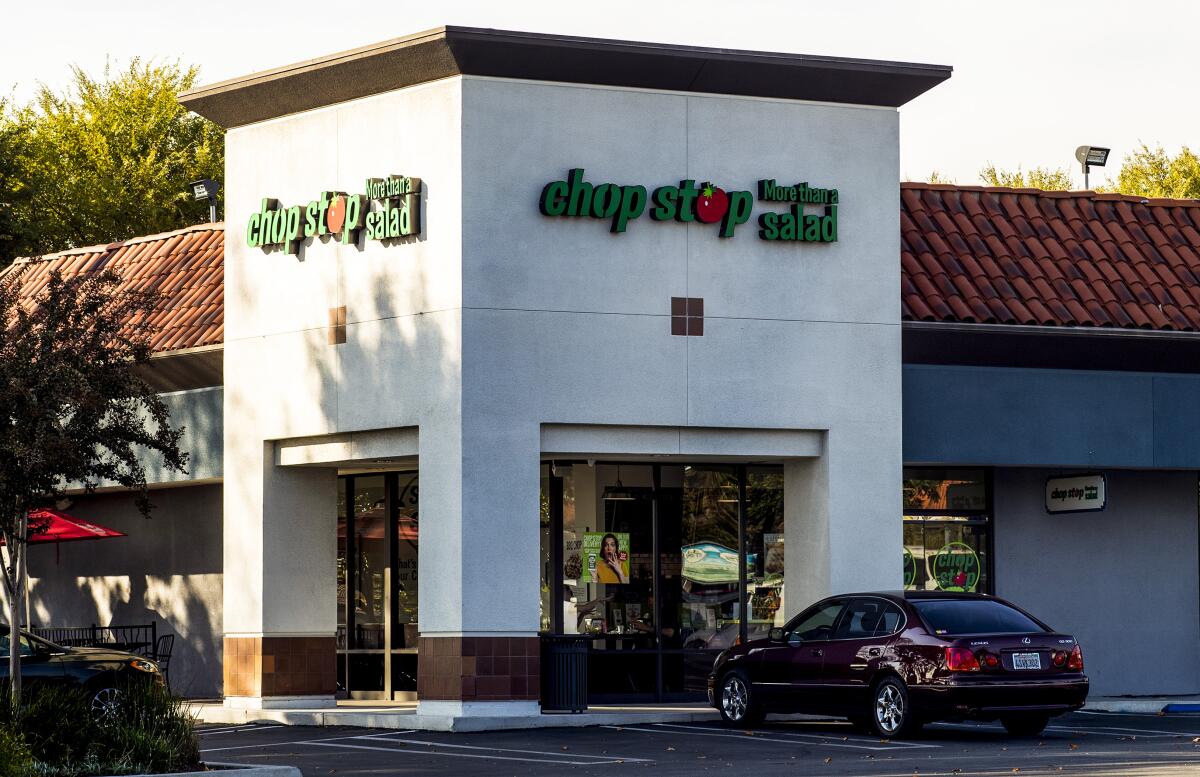
Chop Stop disagrees. In a legal briefing obtained by The Times, Dynamic said Chop Stop wrote in a 2020 letter that it “merely sells generic chopped salads that cannot be characterized as either ‘Mexican’ or ‘Tex-Mex.’”
Besides, Chop Stop maintained, those two “potentially questionable salads … are less than 10% of its sales.”
“I don’t know who’s right here, and I need guidance from the court,” said Jeff Adelman, in-house counsel for Dynamic’s Las Vegas operation. “Do I know whether Santa Fe chop salads are Tex-Mex? I don’t know, and I don’t know who knows. Our stake is in keeping a harmonious center.”
So last December, Dynamic filed for declaratory relief, a legal determination where the plaintiff asks a judge for a ruling about the issue at hand to help decide what further legal action is warranted. They “had no choice,” according to its court filing, “but to file the instant action seeking declaratory relief that will resolve the Defendant’s dispute, and determine Plaintiff’s appropriate course of action.”
In other words, Dynamic wants Nevada Eighth Judicial District Court Judge Mark R. Denton to explore the possibility that maybe the Viva Mexico and Santa Fe salad can be comida mexicana.
“If Chop Stop is right, we are going to get a bunch of rent” from Cafe Rio, Adelman said. The chain has only paid half of it since last September, citing the dispute. “If Cafe Rio is right, [Chop Stop] is going to be in charge of covering our costs and will be in violation of their lease.”
A hearing is scheduled for January.
The Oxnard Tamale Festival has been only to-go for the last two years because of COVID-19. But it continues.
The Chop Stop and Cafe Rio locations in question declined interview requests, citing the pending legal matter. But Chop Stop has filed its own lawsuit against Dynamic for not siding with it in the dispute against Cafe Rio. Besides, the lawsuit claimed, Adelman told Chop Stop last year that Cafe Rio’s position was “erroneous,” and its “overly broad interpretation” of what constituted Mexican food “would almost certainly be rejected by any court.”
Adelman wouldn’t tell me whether he thinks that, only allowing, “It doesn’t appear to me that merely uttering the name ‘Chopurrito’ [referring to Chop Stop’s burrito bowls] that somehow that automatically results in some type of conclusion. A provolone garbanzo bowl, I can’t imagine anyone on Earth call that Tex-Mex food.”
But, he added: “What makes us, as the landlords, somehow an expert on this?“
Legal disputes about what is and isn’t Mexican food aren’t new.
In 2006, a Massachusetts judge ruled that a burrito is not a sandwich after a landlord in Shrewsbury filed for declaratory relief against two of its tenants, Panera Bread and Qdoba Mexican Eats. But the New York Department of Taxation and Finances ruled in 2019 that burritos can be considered sandwiches because they’re made with “wraps,” which just goes to show how terrible the burrito scene is in New York.
Canada’s legal system has also opined on what is and isn’t Mexican food. In 2018, a judge at the Ontario Superior Court of Justice was asked to issue an injunction to stop a Mexican restaurant chain named Holy Guacamole from opening at a mall in the town of New Hamburg. Another tenant named Pita Pit claimed Holy Guacamole’s plan to sell burritos, tacos and quesadillas violated its lease agreement that gave it the monopoly on selling pita sandwiches and wraps.
While not deciding whether those Mexican food items constituted wraps per se, Judge Elizabeth C. Sheard ruled that Pita Pit established a “real risk that it may be put out of business” if Holy Guacamole was allowed to open, and thus sided with Pita Pit.
Chop Stop’s lawsuit against its landlord in Las Vegas doesn’t cite any of these precedents. Its defense, instead, is to wave off any possibility that anyone might think the salads in question are Mexican.
It does admit that the Viva Mexico salad might seem similar to a taco salad, which it classifies as Mexican “or more appropriately Tex-Mex.” But, Chop Stop asserts, “A Taco Salad has either a corn or flour tortilla base which the Viva Mexico [salad] does not have,” which therefore makes the Viva Mexico salad not Mexican food.
In time for Dec. 12, the feast day for the Virgin of Guadalupe, consider Tamales Elena y Antojitos in Bell Gardens and its food truck in Watts.
As for the Santa Fe salad? “Santa Fe is a town in New Mexico, not Mexico or Texas,” Chop Stop’s lawsuit claims. “Cafe Rio does not have an exclusive for Southwestern food or food items.”
Determining what is and isn’t a style of food is a decision wrought with politics, tradition, emotion and money. In this case, Adelman argues, it also comes with a giant liability.
“If we take a position — ‘Chop Stop, you’re screwed, you’re absolutely violating this lease’ — and we sue them, and we lose?” he said “Great, they’re not selling Mexican food, but now I have to pay their fees, and there’s been a determination that they’re not selling Mexican food.
“Then I go to Cafe Rio,” he continued, “and I now have to institute a separate lawsuit to recoup rent. Then it might be determined otherwise that Chop Stop is in fact selling Mexican food.”
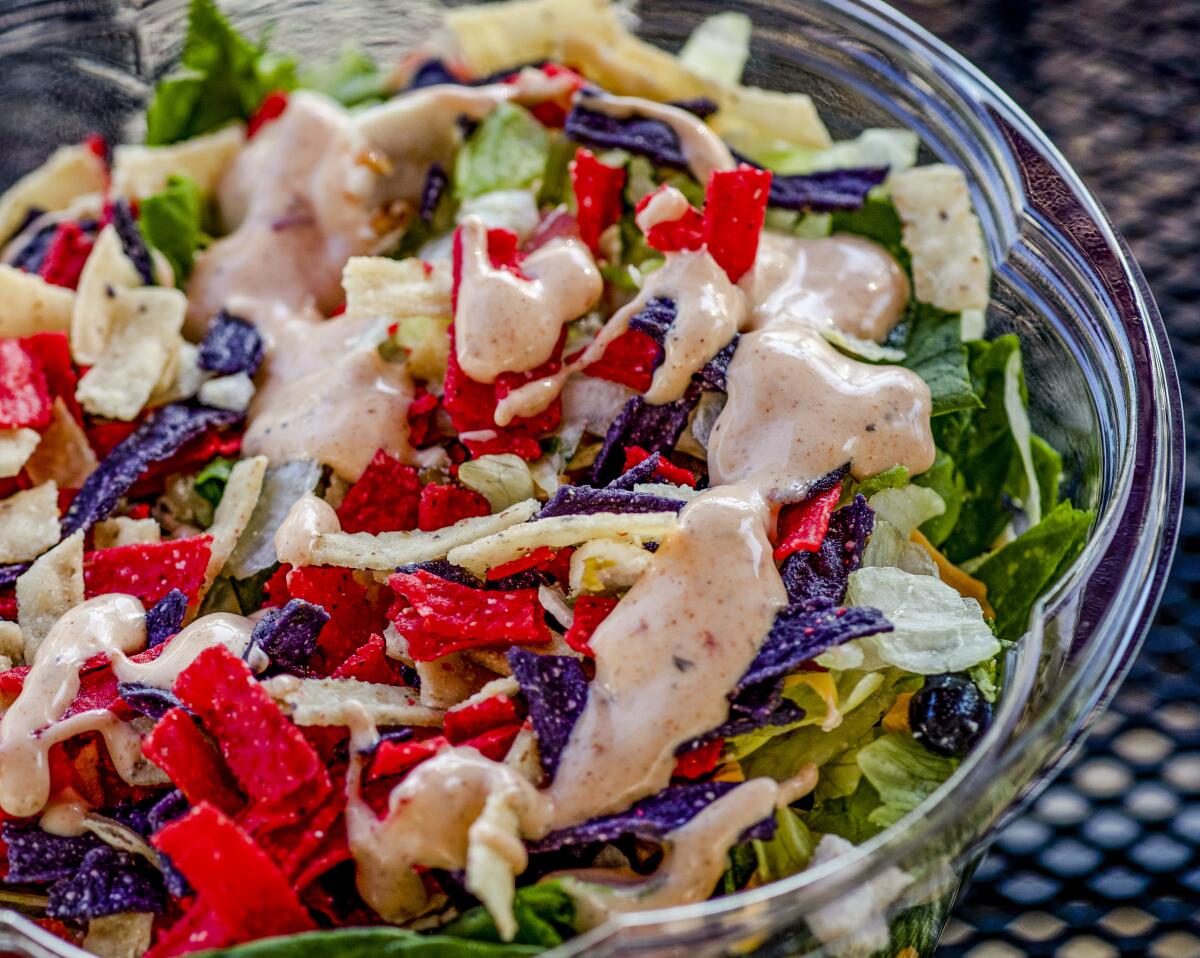
Similar cases have included the expert testimony of chefs, authors and journalists about what they believed was and wasn’t Mexican food. In Pita Pit’s case, they asked the “Sporkful” podcast host Dan Pashman to file an affidavit, in which he stated burritos, tacos and quesadillas were wraps because they were “delivered” that way due to its use of tortillas — an explanation with about as much validity as peas in guacamole, but one that swayed the presiding judge into siding with Pita Pit.
Chop Stop is trying to have it both ways.
The Viva Mexico and Santa Fe salads are about as Mexican as Rick Bayless, so Cafe Rio’s specific case is weak. But there was a point in history where people didn’t think French rolls, shawarma, Czech pilsners and tempura were Mexican food until eaters and cooks transformed those foreign traditions into bolillos, al pastor, Bohemia beer and fish tacos.
What sparked the public’s change in opinion? Popularity and time — the more eaters feel ingredients, meals and foodways are Mexican, and the longer this persists, the more likely they enter the Mexican food canon. Consider Korean tacos, the Mexican-style pizzas sold by the Pizza Patrón and La Pizza Loca chains, and nachos. Or, for that matter, “Mexican” Coca-Cola.
Even the Chopurrito burrito bowl that Chop Stop also maintains is not Mexican food (their lawsuit says it’s “Southwestern” — you know, the region that was part of Mexico longer than it’s been part of the U.S.) now passes as Mexican food in many parts of the United States.
That’s the beauty of the cuisine: It’s not hidebound to tradition and assimilates dishes from across the world with gusto, with the United States its hottest crucible.
Chop Stop wants in on that wave — again, why else would it pick names like Viva Mexico or Santa Fe to represent salads that only superficially evoke the traditions it purports to represent? Nonetheless, I’d tell Judge Denton that Cafe Rio’s claims that the Viva Mexico and Santa Fe salads are Mexican food are spurious — because no amount of time will ever make those items popular enough to be considered Mexican.
As for Chop Stop? Use better ingredients — y no se hagan.
More to Read
Eat your way across L.A.
Get our weekly Tasting Notes newsletter for reviews, news and more.
You may occasionally receive promotional content from the Los Angeles Times.

